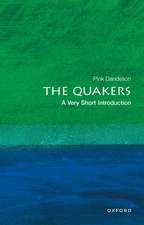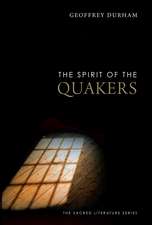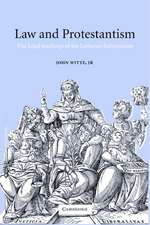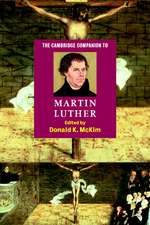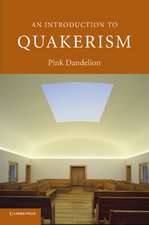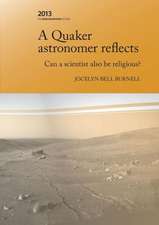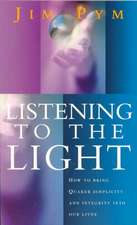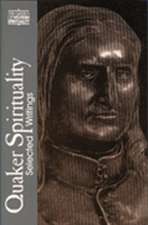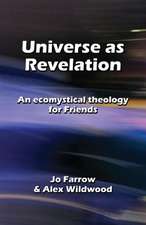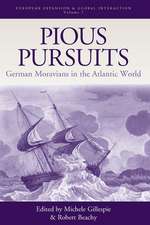The Creation of Quaker Theory: Insider Perspectives
Editat de Pink Dandelionen Limba Engleză Hardback – 26 mai 2004
| Toate formatele și edițiile | Preț | Express |
|---|---|---|
| Paperback (1) | 338.33 lei 6-8 săpt. | |
| Taylor & Francis – 19 oct 2016 | 338.33 lei 6-8 săpt. | |
| Hardback (1) | 768.69 lei 6-8 săpt. | |
| Taylor & Francis – 26 mai 2004 | 768.69 lei 6-8 săpt. |
Preț: 768.69 lei
Preț vechi: 1030.05 lei
-25% Nou
Puncte Express: 1153
Preț estimativ în valută:
147.09€ • 153.96$ • 122.42£
147.09€ • 153.96$ • 122.42£
Carte tipărită la comandă
Livrare economică 31 martie-14 aprilie
Preluare comenzi: 021 569.72.76
Specificații
ISBN-13: 9780754631583
ISBN-10: 0754631583
Pagini: 288
Dimensiuni: 156 x 234 x 23 mm
Greutate: 0.7 kg
Ediția:1
Editura: Taylor & Francis
Colecția Routledge
Locul publicării:Oxford, United Kingdom
ISBN-10: 0754631583
Pagini: 288
Dimensiuni: 156 x 234 x 23 mm
Greutate: 0.7 kg
Ediția:1
Editura: Taylor & Francis
Colecția Routledge
Locul publicării:Oxford, United Kingdom
Cuprins
Contents: Foreword, Arthur O. Roberts; Introduction; Part I Quaker Historiography: George Fox and the politics of late 19th century Quaker historiography, Thomas D. Hamm; Sixty years in early Quaker history, Hugh Barbour; The end of (Quaker) history? Some reflections on the process, John Punshon. Part II Theories of Early Quakerism: Commentary; The inevitability of Quaker success?, Rosemary Moore; Was 17th-century Quaker Christology homogeneous?, Richard G. Bailey; 'Go north!' The journey towards first-generation friends and their prophecy of celestial flesh, Michele Lise Tarter; George Fox and Christian gnosis, Glen D. Reynolds; Part III Early friends and beyond: Commentary; Apocalypse now and then: reading early friends in the belly of the beast, Douglas Gwyn; Holiness: the Quaker way of perfection, Carole D. Spencer; Theoretical reflections of a skeptic about theory, Thomas D. Hamm; Some reflections on an ecumenical pilgrimage, Martin Davie; Taming anarchy: Quaker alternate ordering and 'otherness', Gay Pilgrim. Conclusion: the nature of Quaker studies; References; Index.
Notă biografică
Programmes Leader, Centre for Postgraduate Quaker Studies, Woodbrooke Quaker Study Centre and the University of Birmingham. He is also Editor, Quaker Studies, and Convenor, Quaker Studies Research Association
Recenzii
'This book offers non-Quaker readers a way to assess Friends today and to understand the variations in belief and practice, and will be useful to Quakers in providing self-analysis and course correction.' Arthur O. Roberts, George Fox University, USA 'I know of no other study like it. It brings together significant elements of the sociological, historical, and theological approaches to the study of early and modern Quakerism which have developed in the last 40 years and offers an accessible source for competing theories of/about Quakerism.' Christine Trevett, University of Wales, UK 'All the essays are intelligent; particularly notable is Rosemary Moore's discussion of the reasons for the survival of the Society of Friends... Scholars interested in the Society of Friends will profit from reading this book...' Choice '[Pink Dandelion's] work as an editor is creative and substantive: he 'moderates the meeting', and serves both the essayists and the reader in a way that I have rarely seen in such a collection... It is a valuable and stimulating experience to read this book, and I am grateful that it came my way.' Friends Journal
Descriere
The last forty years has witnessed a 'golden age' of Quaker Studies scholarship, with the bulk of this work into the history and sociology of Quakerism being undertaken by scholars who are also Quakers. For the scholars involved, their Quakerism has both prompted their research interests and affected their lives as Quakers. This book presents a unique study into Quakerism: it draws together the key theories of Quaker origins, subsequent history, and contemporary sociology, into a single volume; and it allows each of the contributors the opportunity to reflect on what led to the initial choice of research topic, and how their findings have in turn affected their Quaker lives. The result is a unique contribution to Quaker theory as well to the discussion on insider/outsider research. This book is invaluable to anyone interested in Quakerism, research into religion, notions of outsider objectivity within academia, and areas of theology, religious history and sociology in general.


